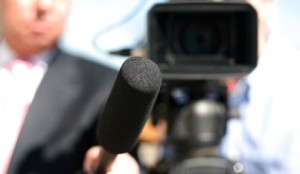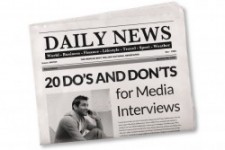You’ve done all the hard work: undergone media training, prepared key messages, developed press materials and identified media targets. Your media relations representative successfully secures media interest for your organization and you’ve been fortunate enough to have been the subject of an interview.
Your media relations work doesn’t end when the interview does! Your company has to be ready to follow-up on that interview in order to achieve the best possible media coverage. While your PR or media relations pro will likely look after anything that needs to be done afterward, there are times when it will be up to the spokesperson to follow through on certain things. 
Here are some tips on what to do after the interview is over:
Offer to provide follow-up information or another interview if needed. A journalist might want to confirm a quote, have you fact check a technical detail or simply want to ask a few additional follow-up questions. Make yourself accessible and welcome any opportunities to help further shape the story.
Ensure media requests for photos, background material or other items are fulfilled and try to be as accommodating as possible. If an interview takes place by phone, for example, sometimes the journalist will ask to arrange a photo for later in the day or week. Stories accompanied by visuals tend to receive more ink and profile.
In addition, facts and figures can easily be misquoted or mistyped, as can hard-to-understand information that support your story. To ensure the story is accurate, it’s a good idea to either provide a print version of this information to the reporter during the interview or send a short recap summary in writing afterward.
Establish media monitoring protocols so that you don’t miss media coverage when it comes out. You don’t have to be a large company that pays for professional (expensive) media monitoring services to collect and evaluate print, broadcast and social media coverage. You can use free services such as Google Alerts and manually monitor any specific outlets or blogs that have interviewed your company.
When your story comes out, analyze your quotes. Often a 15-minute interview will result in just one or two key quotes or sound bites. Study this because it offers insights into the way the media think and operate and what a reporter looks for in a story. The more you understand how the media work, the more you can customize your message to what they want and the greater the chance of success you’ll have with your comments being used in the future.
At the same time, no one is perfect. Where do you think you can improve your interview skills next time around? Sometimes a spokesperson is quoted minimally. If a lot of the article has been paraphrased, perhaps your messages were too long or confusing or weren’t articulated well. Make sure you identify your weaknesses and strive to improve them in future media interviews.
If your quotes communicate your message well, re-use them again! Good quotes are like diamonds. They are valuable, memorable, pithy and can really make you shine! It is more important to communicate your message confidently, clearly and consistently than it is to be original.
Follow-up a good interview or stories with a note to the journalist. Reporters deserve genuine gratitude for their efforts but don’t thank them outright because they didn’t write the story to do you a favour. In their minds, they were doing their job as an objective reporter. If you think the reporter did a good job homing-in on a particular aspect of your company, it’s okay to provide sincere feedback. For instance, tell them that you enjoyed reading the story and have received several phone calls from the public requesting more information on the company. You really appreciate the time he took and look forward to reading more of his stories in the future.
The story sucks; don’t get angry at the reporter. If you think you did everything right during the interview and the story is biased or not as flattering as you would have liked or maybe not quite as you expected, resist the temptation to get angry at the journalist. You don’t know what happened behind-the-scenes. It might be that his editor had to cut the story at the last minute and turn it into a brief. Try to find out what happened, learn from it and move on.
Update your media contact list if needed. If you have met a new journalist, make sure you update your database with his or her contact details and any other pertinent notes so that the next time you reach out to this person, you can do so armed with the right information.

